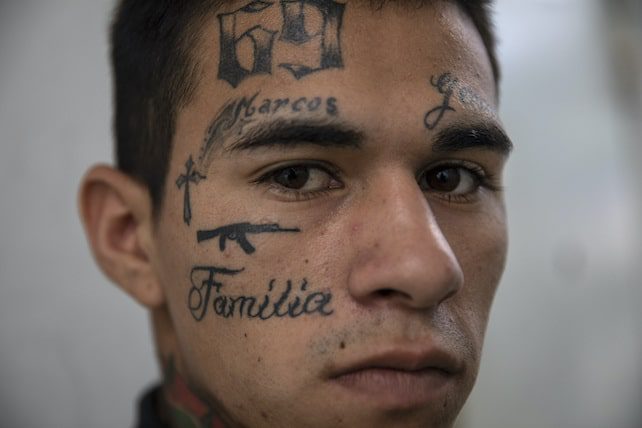“Drug traffickers want to take over the evangelical units because for them it’s a business,” he said. “From here crimes can be ordered and drugs sold.”
Each evangelical unit at Pinero is run by 10 prisoners who have about 15 assistants for the 190 inmates. “They’re in charge of controlling everything and keeping the peace,” Gallardo said.
“We don’t use knives, but the Bible to take over a cellblock,” said Pentecostal pastor Sergio Prada. Prisoners who want to be allowed in, he said, must comply with rules of conduct, including praying three times a day, giving up all addictions and fighting.
As he led a recent meeting for 90 prisoners at an evangelical unit in Pinero, Prada told them to put their old criminal lives behind.
“That old man has to die!” he shouted, referring to their previous identities.
As he heard these words, Anguilante closed his eyes and cried. He later would say that he already “buried” his old self, the one who murdered and who has been imprisoned for seven years.
“Not everyone can, but you have to try,” he said.
___
At Penal Unit No. 1 in Coronda, the day in the evangelical units begins and ends with prayer.
One of those praying is Juan Roberto Chávez, who was imprisoned for 16 years in various jails in Argentina and served the last eight years in Coronda. “I hated the world,” he said. “I wanted to destroy it.” He recalled that he lived mostly confined in punishment cells.
“The kids who would arrive would turn into monsters” in prison, Chávez said. He tried and failed to escape. Desperate, he stitched his mouth shut and went on hunger strike.
“Then I got tuberculosis. I was dying,” he said. “I hit rock bottom and I had a revelation.”
On a recent day, Chávez embraced 37-year-old José Pedro Muñoz, who expected to be released on parole after serving an 18-year-sentence.
“Now, you have to be stronger than ever,” Chávez told him.
Muñoz was nervous; the wait for release seems endless. He was a hit man for the Los Monos gang and his body is a testament to Rosario’s drug war. Scars from two shotgun blasts mark his chest. Another from a 9mm bullet crosses his abdomen.
“I set fire to bunkers (armored places where cocaine is sold) with people inside. We did it to drive out the (rival) drug dealers,” he said.
But soon came bad news. A guard arrived and told him that he would remain in prison because other charges had been filed against him.
A few minutes later, he joined other prisoners in prayer.
__
Associated Press religion coverage receives support from the Lilly Endowment through The Conversation U.S. The AP is solely responsible for this content.

